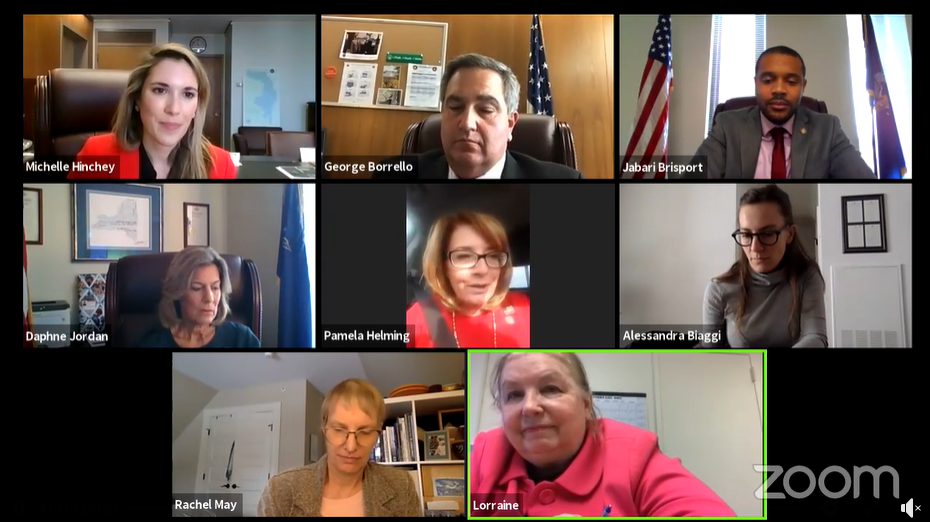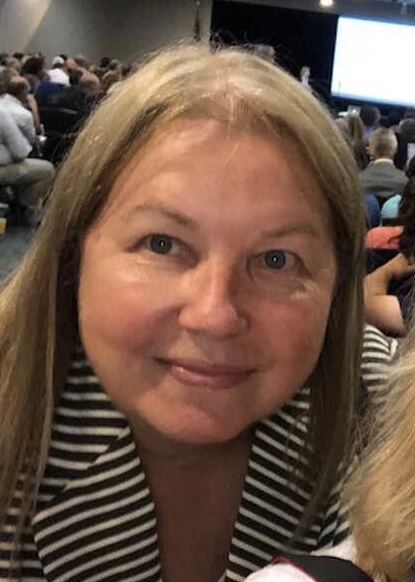
By Sherry Bunting, Farmshine, March 12, 2021
ALBANY, N.Y. — “Danger knocked on New York’s doors when the World Trade Centers went down. Hunger knocked hard on our doors during Covid,” said Lorraine Lewandrowski, agricultural law attorney and dairy producer near Herkimer, N.Y., during one of New York State Senate Ag Committee’s recent hearings organized by Senator Michelle Hinchey, chairwoman.

Lewandrowski has been a tireless advocate and activist for dairy and livestock agriculture, making connections in all sorts of ways for the people of her beloved farmscapes of New York and the greater Northeast.
“Our food model is based on faraway sources while we throw our rural communities away,” Lewandrowski told the New York senators. “Farmers here are asking for crumbs. The big money is in the port capacity being ramped up for imports.”
In her testimony, Lewandrowski detailed several key issues facing dairy farmers and rural communities in the Northeast. Other farmers and dairy producers, along with representatives of farm organizations, farm markets, Farm Credit, FFA, urban food programs, and academia, were also on the hearing docket.
Describing dairy farmers as ‘price takers’ without real bargaining power, Lewandrowski called the milk pricing formula “broken and antiquated and in need of investigation.”
One of the biggest surprises for New York State Senators was Lewandrowski’s request that the state legislature legalize whole milk in schools.
“Make it legal for a New York State student to have a glass of fresh whole milk – a beautiful food from a beautiful land,” she said.
During questions, senators expressed their surprise about this and indicated a real desire to do something about it at the state level, despite the federal government’s heavy-handed USDA National School Lunch rules. If more states took action, perhaps the tide could turn.
On the milk pricing system, Lewandrowski pointed out that since May of 2020, the current pricing formula “has extracted billions of dollars” from dairy farmers’ milk checks, and she urged the committee to investigate how this is impacting New York State dairy farmers. She urged them to look at Farm Bureau’s work on this topic.
With ongoing concerns about market transparency and competitiveness, she referenced a 2019 GAO report requested by U.S. Senator Kirsten Gillibrand, looking at dairy cooperative consolidation and what this means for New York.
Referencing a ‘cow islands’ map produced a few years ago by Dr. Mark Stephenson, Lewandrowski said milk production is rapidly consolidating with more cows located on fewer and ever-larger farms in fewer regions.
“Thirty-thousand and 100,000 cow operations have arisen, some in dry regions. Contrast ‘cow islands’ with the emptied-out New York farmscapes,” she said, lamenting a Cornell report “Green Grass, Green Money” citing over 3 million acres of abandoned farms and former grazing lands in New York even though “New York equals powerful rainfed landscapes.”
Lewandrowski stressed that farmers need more lending and financing options and resources to understand new “ecosystem markets.” She indicated state legislatures can take the lead in helping prepare farmers for the future with allocation of informational and financial resources to navigate new ideas and income streams. Her fear, she indicated, is that a centralized approach will create winners and losers across regions and farm sizes.
In making her most impassioned point of the day on communications with New York City, Lewandrowski said: “We want to speak, as farmers, with the New York City Council and urban leaders. Why can’t we have a Jacob Javits Center Farm Show, a farm show like they have in Paris, or an office for New York’s farm groups in New York City or an online hub to connect farmers with urban groups looking for speakers?”
She talked about the screening of the dairy-focused Forgotten Farms film a year ago, just before the Covid pandemic. So many rural urban connections were made, but the linkages between rural New York and urban NYC need to continue and be constant.
Rural trauma was her final thought for the committee. As an agricultural law attorney, Lewandrowski sees so many concerning and desperate cases.
She bluntly addressed Senator Jabari Brisport of Brooklyn, who is a new member of the NY Senate Ag Committee, about his own comments as a vegan activist, and the damage such comments do to New York’s own rural farmers.
“Rural New York has been viciously neglected. When farmers come to my office and tell me they feel dead, I worry,” said Lewandrowski. “This is directed to Senator Brisport: Senator, I heard your words as you led a rally in New York City calling for New York’s dairy farms to die. Your exact words: ‘Let dairy die the death it needs to die.’ Two hundred miles away, I was dealing with a woman who found her son hanging dead in the barn, too ashamed to speak of his death.
“Senator Brisport, I will not forget your cruel words directed to the working farmers of this state whom I know and love,” Lewandrowski said candidly. Dairywoman Tammy Gendron of Willet also referenced concerns about Sen. Brisport’s activism against dairy and livestock production in her comments later in the session.
During questions, Senator Brisport apologized for his word choice of “death” when speaking about dairy at the vegan rally, but he stated that as a sitting Senator on the New York Senate Ag Committee: “I don’t believe dairy should exist, just as I don’t believe any animal agriculture should exist, so you can count me as a ‘no’ vote on any whole milk in schools…”
He also noted one of his focuses is farm workers and asked for more details on collective bargaining from Lewandrowski’s testimony. He was keying-in on worker bargaining and totally missing the point that farmer-owner-operators have little bargaining power as cooperatives they own are consolidating and joint-venturing as processing entities.
Lewandrowski provided information about antitrust interpretations and consolidation in the industry to massive corporations that prevent farmers from collectively setting a good price for their milk.
Basically, she said, “we should be looking at revitalization and re-regionalization of our food production and processing facilities, so we have smaller cheese plants or vegetable processing or meat processing, where the farmers have a choice with competition for their product. We have lost so much of the food processing in New York. This committee could really help with that by making financing available to revitalize regional processing and brands to serve our Big Apple and our other cities.”
Senator George Borrello thanked Lewandrowski for her comments and passion. “Dairy in NYS is a very different business… 90% or more of our farms are family run businesses. Therefore, you will see these animals treated much more humanely. If we lose our dairy farms that are handling animals in New York State, we are going to be relying on farms elsewhere. The demand is not going to go away, so why don’t we ensure it’s from our farms in New York State,” said Borrello.
Senator Alessandra Biaggi took hold of the issues of whole milk in schools and communication between rural and urban New York. Much back and forth brainstorming ensued.
“There’s a lot to action in what you have shared,” Biaggi pointed out, citing first the unbelievable fact that whole milk is prohibited in schools.
“I thought you were joking,” the Senator said.
Lewandrowski talked about the 30,000-signature petition (over 24,000 online and over 6,000 by mail) that had been submitted to USDA and members of Congress, and she gave some of the background in regard to the Dietary Guidelines for Americans (DGA).
“Whole milk is a really tremendous product, and it is our most local product, fresh and produced 365 days a year,” she said.
When asked about the fat, Lewandrowski noted that the DGAs don’t reflect the current science on milkfat and saturated fat, in general, and especially for children.
“The fat is not very high. In reality, it’s standardized to 3.25% fat. Skim milk and 1% and 2% are not much behind that, but dairy as a whole product provides better satiety… so children may eat less junk food, and it may be easier to digest,” Lewandrowski noted. “As farmers in the Northeast, our best aspect is that we are local and produce fresh whole milk.”
Biaggi also stressed that one of the best things about New York is the Upstate being “full of possibilities, if we invested in it.”
She asked: “How did we get to a place where we’ve essentially abandoned the farms, the Upstate?”
Identifying the issue as cultural, pointing out how the cities in France are so proud of their rural areas, Lewandrowski asked the NY Senate Ag Committee to help facilitate connections between rural farms and urban leaders.
“I think there’s a real desire in our urban areas to learn more, so we ask for the committee to help us tap into that,” said Lewandrowski, citing many of the farm-city events she has taken part in, but looking for structural connections that continue and have meaning at the policy level.
Biaggi said this is one of the most important areas for the future of New York State, bridging the Upstate / Downstate, especially where food and agriculture are concerned.
Regulatory issues, workforce and lending resources, as well as gaps in the food system and examples of how locally produced food was diverted to nonprofits for giving during Covid were other major topics highlighted during the hearing.
-30-

I grew up in a farming community and now live in one just over the hill from there. I have watched farms sold off for the land to be developed, the Oneida Indian Nation buying them for them to sit empty and unused because farmers can’t make it in today’s world. And it has nothing to do with their dedication, knowledge or education; farmers work harder than almost any other profession and they do so knowing that it will be back breaking work with very little reward except for a love of what they do. Why can’t we support them? Offer them a true financial value for the food they provide? In a time when we are finding that the more natural the food we consume is, the better – why aren’t we making it easier for the small independent farmer to continue to produce? Do we really want nothing but corporation farms?
As for connecting with urban areas – are there still programs like the Sunshine Kids (I think that is what it was called) where children from urban areas are offered a chance to go spend time during the summer with families in rural areas? Might be an easy way to help start a new generation of people who have a knowledge and appreciation for the rural communities and ways of life.
LikeLiked by 1 person
Pingback: Bipartisan Whole Milk bill introduced in U.S. Congress | Ag Moos
It would be terrible to lose the Dairy portion of agriculture. Hard workers, honest people and good nutrition. Of course there are vegans out there busily milking their almonds. Wonder if they use machines or do they require hand milking.
LikeLiked by 1 person
Pingback: NY Senate Ag Hearing: Ag Law Attorney Shares Her Concerns for Family Dairy Farms – Daily Yonder | Law News
Pingback: The long and the short of it | Ag Moos